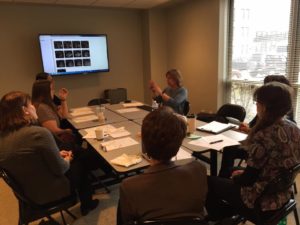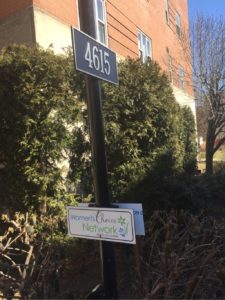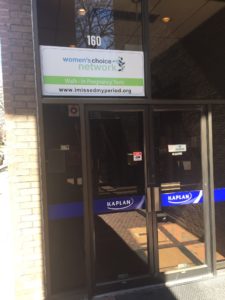
People have been hurt enough by these right-wing anti-abortion centers passing themselves off as abortion clinics. So what say we do something about them, eh?
By Lady Elaine
A new resource has emerged that exposes walk-in clinics set up to trick teenagers and women into carrying out their pregnancies. Expose Fake Clinics Pgh is a project that puts Crisis Pregnancy Centers (CPC) on blast. Otherwise known to women’s health and pro-choice advocates alike as “fake clinics”, CPCs are non-profit religion based offices that are set up with the sole purpose of stopping women from seeking out or obtaining an abortion. In an attempt to woo women away from clinics that also provide abortions, they lure in females, especially targeting the young and pregnant, with their deceptive billboards, websites, literature, and a variety of other dishonest tactics. Dressed in medical garb, they are not licensed medical facilities, yet offer free pregnancy tests, sonograms, and supposed medical advice and counseling services.

By preying on women at a vulnerable moment in their lives, CPCs persuade people seeking healthcare and information into visiting their centers. Once inside, the woman is met with a strict anti-abortion agenda and some medical misinformation- sometimes outright lies. CPC staff have been known to talk women out of birth control, use sonogram images mixed with counseling/prayer as emotional arm twisting, and by mixing a neutral clinic environment with an anti-choice agenda, they succeed in promoting ideology over evidence.
Expose Fake Clinics Pgh is a new campaign launched by the Socialist Feminist Committee of the Democratic Socialists of America (Pittsburgh DSA). On the website, one can find information on how to identify a CPC, a list of CPCs in the area, where to obtain an abortion, how to take action (albeit only through the group DSA), a discussion on barriers to reproductive justice in PA, and further reading on abortion.
While the CPC locations and abortion resources are region specific, the information about CPCs is not at all unique to Western PA. Figures from 2017 report that there are more than 3,000 CPCs across the country- in every state- and their tactics are nearly identical at each. The model used by DSA to expose fake clinics could easily be duplicated in other cities.

The beginnings of this anti-CPC campaign are rooted in an agreement by DSA members “that the risk these ‘clinics’ pose to people in the area was urgent and needed to be met with strong and purposeful action,” says Sofia, Secretary of the Socialist Feminist Committee of DSA Pittsburgh. “We elected the anti-CPC campaign as our committee’s main external project. Internally, we’ve been focusing on efforts to make the DSA more child and caregiver friendly.” Members doing this pro-choice work are parents and caregivers.
In 1967, the first Crisis Pregnancy Center in the U.S. was opened by Robert Pearson in Hawaii. As a way to promote the Pregnancy Center Movement, Pearson, a home builder of Roman Catholic faith, founded the Pearson Foundation in 1969. The Pearson Foundation was a St. Louis-based anti-choice organization that assisted local groups in setting up crisis counseling centers. The foundation’s training materials included a 27 minute slideshow, called “Caring,”of photos of bloody fetuses in trash bins and one of a gurney carrying a woman who is apparently dead and is covered by a sheet. It ends by comparing abortion to Hitler’s “final solution.” In 1984, Pearson authored a widely used training manual where he outlined how to deceive women. How to Start and Operate Your Own Pro-Life Outreach Crisis Pregnancy Center is a manual described by law-enforcement officials around the U.S. as a 93-page guidebook of ways to mislead consumers.

Pearson has publicly admitted this deception. In a 1994 speech, he responded, “obviously, we’re fighting Satan… A killer, who in this case is the girl who wants to kill her baby, has no right to information that will her kill her baby. Therefore, when she calls and says, ‘Do you do abortions?’ we do not tell her, no, we don’t do abortions.”
The majority of CPCs are overwhelming run by anti-choice conservative Christian groups. Some are run by the Catholic Church or by other church groups. CPCs gained power throughout the ‘80s and ’90s through the support of a few major umbrella organizations, Care Net and Heartbeat International.
However, it is a myth that they are funded only by private dollars from anti-choice donors. They are also funded publicly, receiving tax dollars from state governments. States set aside money for anti-abortion centers that do not provide medical care and will not refer clients to clinics that prescribe birth control.
In 2001, Pennsylvania was the first state to start funneling money from welfare funds to support CPCs. The funding to support CPCs comes from Temporary Assistance for Needy Families program (TANF, a.k.a. welfare). By 2006, 20 states subsidized CPCs. Between 2001 and 2006, over $60 million in federal funds- much of it from welfare or family planning budgets- was paid to CPCs, mostly to support abstinence education.
Pennsylvania alone gave more than $30 million from 2012 to 2017 to Real Alternatives, a network of pregnancy centers. The state reimbursed the centers for providing ideological counseling to pregnant women at more than $1 per minute.
A handful of CPCs have also received indirect funding from the federal government during the Obama administration. Additionally, 29 states funnel money to CPCs through the sale of “Choose Life” license plates.
Critics of CPCs illustrate that the emphasis on abortion alternatives drains money from basic health care. As evidence, they point to practices in Texas. Texas anti-abortion groups had counseled 660 women and teens with the tax dollars made available by the shift in resources. Even lawmakers questioned the cost: the counseling had run an average of $450 per client. By comparison, a year of exams and contraception costs $180. (Figures from 2007)
Evolving with the times, CPCs now use the Internet as a means of advertising. Some use search engine optimization to get their websites closer to the top of search results or bid against abortion providers to appear at the top of sponsored link sections on search engines such as Google. CPCs will often use two websites, one fundraising website that details an anti-abortion mission to secure donors, and another website that provides alleged medical information to attract women seeking contraception, counseling, or abortion.
“When people google ‘abortion’ and ‘pittsburgh’ CPCs are often the first places to show up. The more traffic we can generate on our website, the better chances that people will see it pop up in a search, and be able to get the facts, rather than be duped by a fake clinic that is just trying to coerce them or waste their time,” Sofia says.
Google’s ad policy prohibits misrepresentation, which is why the company started removing fake clinic ads in 2014, after an investigation found that most Google searches for “abortion clinic” produced one ad or more for an anti-choice clinic in each state. However, CPC ads remain.
Sofia notes that the biggest thing people can do to combat CPCs is to “Raise awareness. It’s just something many people don’t know about until they’ve dealt with one of these clinics, and by then it’s too late to change their experience.”
Antifascist groups such as Anti-Racist Action (ARA) have a long history of fighting for reproductive freedom, using the same tactics they use to fight against organized white supremacist groups. Because of the work members had been doing, at a conference in 1997 ARA adopted its fourth Point of Unity to read “We defend abortion rights and support unrestricted reproductive freedom for all.”

When contacted, Keystone ARA gave this statement:
“Some of our chapter’s members have been participating in direct confrontation of anti-choice activists for two decades. These anti-choicers engage in campaigns of violence, harassment, disinformation and obstruction of clinics that provide abortions and women who are seeking medical care. When people commit systemic acts of oppression like this, we feel a duty to practice community self defense.”
Like Sofia, many defenders of reproductive freedom work towards creating child friendly spaces and positive systems of support for women and girls. Social programs, healthy environments of support, and encouragement that continues for the mother after giving birth as well as the baby, not just lip service to “God’s Miracle” when it is a fetus.


More Stories
Coalition to March on the RNC to continue permit struggle despite new city ordinance
Philly Area White Lives Matter Propagandist Identified as Local Business Owner
So…Who Is This Kilted Man In A Philly Suburb Doing “White Lives Matter” Stickering Stuff?